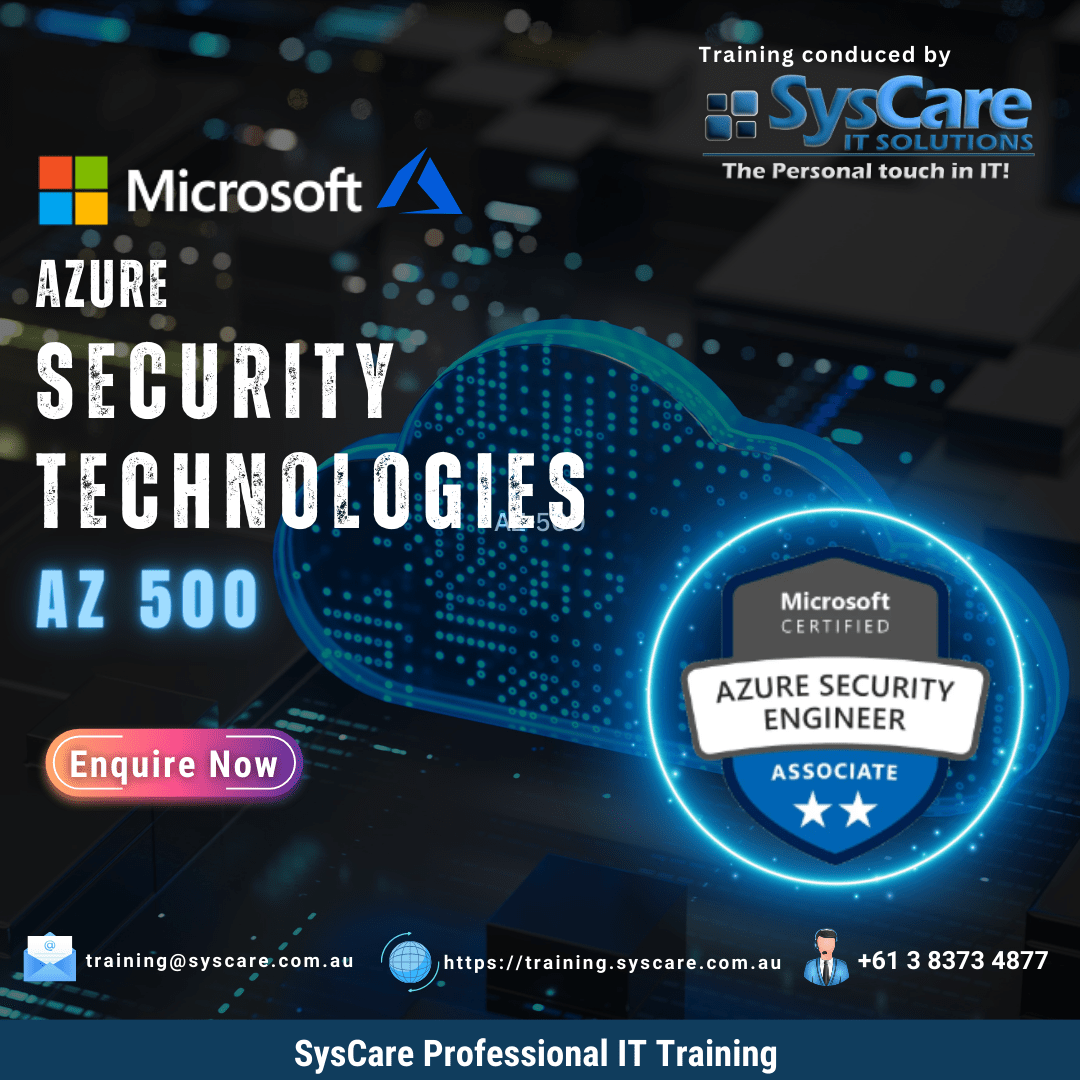Course Overview
The AZ-500: Microsoft Azure Security Technologies course is a comprehensive training program meticulously crafted for IT security professionals seeking to bolster their expertise in securing Microsoft Azure environments. This course goes beyond the basics, offering in-depth knowledge and hands-on skills required to implement robust security controls, proactively maintain an organization’s security posture, and adeptly identify and remediate security vulnerabilities within Azure cloud services.
In this intensive training, participants are immersed in a diverse array of essential topics, empowering them to confidently navigate the complexities of Azure security:
1. Identity and Access Management: Participants delve into the intricacies of identity and access security, mastering the art of securing identities, managing Azure Active Directory effectively, configuring and managing Azure AD identities, and implementing advanced techniques such as Azure AD Multi-Factor Authentication. This module equips professionals to establish fortified access controls, safeguarding sensitive Azure resources from unauthorized access.
2. Platform Protection: Ensuring the resilience of Azure resources is paramount, and this module equips participants with the skills to achieve just that. Topics covered include implementing robust network security measures, securing virtual machines against potential threats, configuring Azure Key Vault for the secure storage of sensitive information, and harnessing the power of Azure Policy and Blueprints to ensure comprehensive compliance and governance.
3. Data and Applications Security: Securing data and applications within the Azure ecosystem demands specialized knowledge. Participants learn how to implement advanced encryption techniques for Azure storage, fortify Azure SQL databases against various security threats, configure Azure Information Protection for meticulous data classification and protection, and explore diverse Azure application security options. This module provides a holistic understanding of data security best practices within Azure.
4. Security Operations: Effective security monitoring and swift incident response are pivotal aspects of Azure security. This module equips participants with the skills needed to configure Azure Security Center policies, adeptly manage security alerts, conduct thorough investigations, and respond promptly to security incidents. Furthermore, participants gain expertise in leveraging Azure Sentinel, Microsoft’s advanced threat detection and response tool, to enhance their organization’s security posture.
Upon successful completion of the AZ-500 course and certification, IT security professionals not only validate their proficiency but also demonstrate their ability to architect and maintain a secure Azure environment. This certification stands as a testament to their expertise, making them invaluable assets for organizations relying on Azure cloud services. Investing in AZ-500 training ensures that professionals are equipped with the latest knowledge and skills, ensuring the robustness and resilience of Azure-based infrastructures.


This certification is ideal for security engineers, security analysts, and other professionals who have expertise in implementing security solutions in Azure.
- Module 1 : Secure Azure solutions with Azure Active Directory
- Module 2 : Implement Hybrid identity
- Module 3 : Deploy Azure AD identity protection
- Module 4 : Configure Azure AD privileged identity management
- Module 5 : Design an enterprise governance strategy
- Module 6 : Implement perimeter security
- Module 7 : Configure network security
- Module 8 : Configure and manage host security
- Module 9 : Enable Containers security
- Module 10 : Deploy and secure Azure Key Vault
- Module 11 : Configure application security features
- Module 12 : Implement storage security
- Module 13 : Configure and manage SQL database security
- Module 14 : Configure and manage Azure Monitor
- Module 15 : Enable and manage Microsoft Defender for Cloud
- Module 16 : Configure and monitor Microsoft Sentinel
- Security best practices and industry security requirements such as defense in depth, least privileged access, role-based access control, multi-factor authentication, shared responsibility, and zero trust model.
- Be familiar with security protocols such as Virtual Private Networks (VPN), Internet Security Protocol (IPSec), Secure Socket Layer (SSL), disk and data encryption methods.
- Have some experience deploying Azure workloads. This course does not cover the basics of Azure administration, instead the course content builds on that knowledge by adding security specific information.
- Have experience with Windows and Linux operating systems and scripting languages.
Exam Format: Multiple Choice Questions
Duration: mins
Number of Questions:
Passing Score:
Certified Cloud Security Engineer (C|CSE)
Certified Cybersecurity Technician (C|CT)
EC-Council Certified Incident Handler (E|CIH)
Certified Secure Computer User (C|SCU v.3)
Brochures
Unlock your potential with SysCare! Download our course brochures today and explore a world of knowledge and opportunities. Don’t miss out!.

